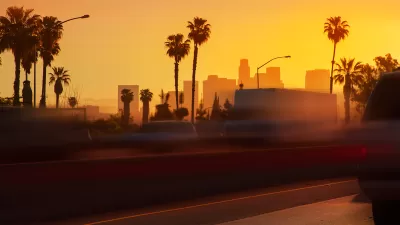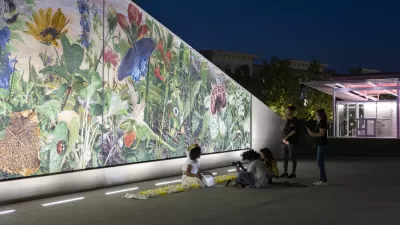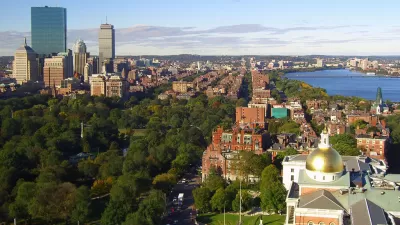A longread, written by Sam Boch and published by Places Journal, has been creating a stir online and is highly recommended for those with an interest in intersections between social justice and urban design.

"Shade is often understood as a luxury amenity, lending calm to courtyards and tree-lined boulevards, cooling and obscuring jewel boxes and glass cubes. But as deadly, hundred-degree heatwaves become commonplace, we have to learn to see shade as a civic resource that is shared by all," writes Sam Bloch.
Shade, according to Bloch, is an index of inequality.
The primary case study for this case is Los Angeles, where the inequality of shade plays out at bus shelters, on the sidewalks, and in the front yards of low-income and minority neighborhoods—enabled by city policies designed for more affluent, suburban neighborhoods and manifested by decades of traffic engineering that prioritizes the fast movement of single-occupant automobiles.
"A few years back, Los Angeles passed sweeping revisions to the general plan meant to encourage residents to walk, bike, and take more buses and trains. But as Angelenos step out of their cars, they are discovering that many streets offer little relief from the oppressive sunshine." What's needed more equally distribute shade, according to Bloch, is a better understanding of shade as a public resource, "a kind of infrastructure."
That understanding runs up against political groups that use shade in a weapon to obstruct new development. "They show up at planning meetings to protest tall buildings that would block views or darken sunbathing decks, and police urge residents in high-crime neighborhoods to cut down trees that hide drug dealing and prostitution. Shade trees are designed out of parks to discourage loitering and turf wars, and designed off streets where traffic engineers demand wide lanes and high visibility."
The article includes a lot of insights offered by experts on Southern California architecture and history, personal and hyper-local anecdotes from neighborhoods around Los Angeles, failed efforts to plant new tress, and the still-nascent progress of more welcoming ideas about shade and urban design influencing even the most high profile urban design projects, like for Pershing Square in Downtown Los Angeles.
One big takeaway from this thorough and exhaustive study bears repeating (and necessitates that planners and urban designers set aside the time to read and re-read this article): "So to the list of environmental injustices in this country, we can add the unequal distribution of shade."
FULL STORY: Shade

Maui's Vacation Rental Debate Turns Ugly
Verbal attacks, misinformation campaigns and fistfights plague a high-stakes debate to convert thousands of vacation rentals into long-term housing.

Planetizen Federal Action Tracker
A weekly monitor of how Trump’s orders and actions are impacting planners and planning in America.

In Urban Planning, AI Prompting Could be the New Design Thinking
Creativity has long been key to great urban design. What if we see AI as our new creative partner?

King County Supportive Housing Program Offers Hope for Unhoused Residents
The county is taking a ‘Housing First’ approach that prioritizes getting people into housing, then offering wraparound supportive services.

Researchers Use AI to Get Clearer Picture of US Housing
Analysts are using artificial intelligence to supercharge their research by allowing them to comb through data faster. Though these AI tools can be error prone, they save time and housing researchers are optimistic about the future.

Making Shared Micromobility More Inclusive
Cities and shared mobility system operators can do more to include people with disabilities in planning and operations, per a new report.
Urban Design for Planners 1: Software Tools
This six-course series explores essential urban design concepts using open source software and equips planners with the tools they need to participate fully in the urban design process.
Planning for Universal Design
Learn the tools for implementing Universal Design in planning regulations.
planning NEXT
Appalachian Highlands Housing Partners
Mpact (founded as Rail~Volution)
City of Camden Redevelopment Agency
City of Astoria
City of Portland
City of Laramie





























